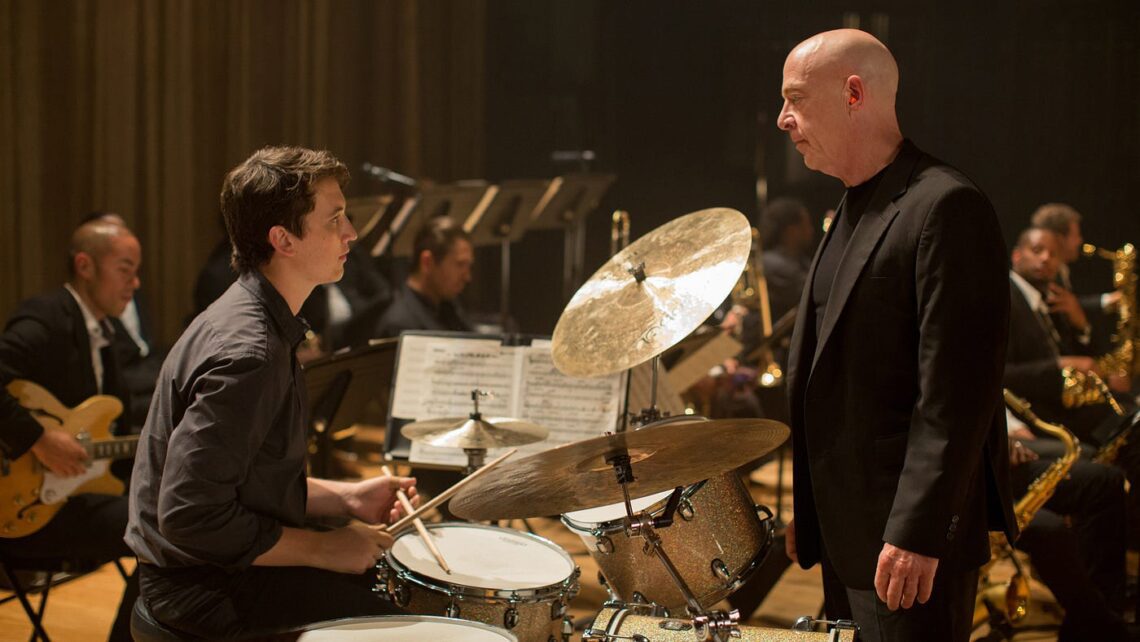This past weekend, my friends and I took a small trip to Oklahoma City to the local Cinemark to view a 10-year anniversary of the film, Whiplash. A highly regarded indie film many praise, and boy did the critics did not disappoint; I sure did receive much Whiplash from the film itself. Other than astounded by the intimate filmography, a keen sense of writing with an entree of psychological drama, I couldn’t help but resort my mind back to Doppelgängers and Doubles when viewing the progression-into-madness of the protagonist due to the antagonist’s status and the worth he holds in the protagonist’s mind.
A Toxic Relationship
Andrew Neiman, a freshman at New York Schaffer Conservatory has a special gift of playing the drums. We see him practicing, often with a sense of passion throughout his playing mixed with literal blood, sweat, and tears. But why must he perform at such physical level? Why must he push himself to such limits? That is where top jazz conductor, Terence Fletcher comes into play. Fletcher invites Neiman into his jazz group, where he is quickly feels Fletcher’s rather abusive and hurtful wrath; spitting out words of hatred, inducing physical violence via slapping and throwing chairs/equipment all in hopes to weed out students and their desire to practice while also to “create the next Charlie Parker.”
After an on-stage feud with Neiman and Fletcher which ultimately gets both parties dismissed from Schaffer, Neiman finds Fletcher at a jazz bar, playing piano in which they meet for a drink afterwards. Fletcher invites Neiman to his jazz band, which was ultimately a set-up in order to humiliate Neiman on stage within one of the biggest jazz groups of New York.
Stockholm Syndrome?
I provided context to these particular scenes and characters (because not only did I want an excuse to ramble about one of the greatest movies I have watched recently), but to provide a small sense of the descent of Andrew Neiman and his desire to impress Fletcher. If we compare the beginning character of Andrew Neiman to the ending character of Andrew Neiman, we see a divided identity of the man he was vs. the man he is now. In the ending scene (also arguably one of the best ending scenes in cinema), we see a tragedy of Neiman still attempting to impress (and succeeding) Fletcher despite everything he has done to him. Neiman has proved himself insane, spiraling into a descent where the only thing he can think of is impressing Fletcher, even after Fletcher humiliated him by lying to Neiman about what pieces were going to be played at the concert. He plays an eight minute drum solo in the middle of the concert, showing off his skills to Fletcher, feeling accomplished. This scene strikes me as tragic because all I am reminded of is the beginning of Whiplash, where Neiman was passionate about playing the drums in a much less, mentally unstable way, because that was even before he met Fletcher himself. The division in toxic power, hunger, and desire Neiman develops is but a depressing act, as the remnants of the young, innocent man are now gone due to Fletcher’s abuse. As I was watching the film, that scene alone reminded me of The Picture of Dorian Gray and Dorian’s descent to madness once he figured out how he could use his charisma for manipulation.
What. A. Film.






Comments by Iman Shoaib